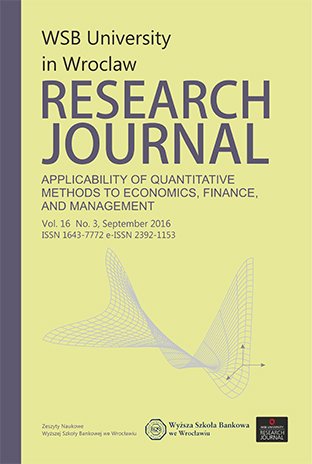Asymetria w rozkładach wygranej a decyzje podejmowane w warunkach ryzyka w świetle badania eksperymentalnego
DOI:
https://doi.org/10.29015/cerem.204Słowa kluczowe:
eksperyment, asymetria rozkładu wygranej, ryzykoAbstrakt
Cel: Celem artykułu jest ocena wpływu asymetrii rozkładu wygranej na skłonność do podejmowania ryzyka.
Metoda badawcza: Artykuł jest wynikiem przeprowadzonego wśród studentów uczelni wyższej eksperymentu. W trakcie eksperymentu sprawdzano wpływ asymetrii rozkładu wygranej na decyzje o udziale w grze losowej, której wynik wpływał pozytywnie lub negatywnie na liczbę punktów, które student mógł zgromadzić w celu zaliczenia przedmiotu.
Wnioski: Przeprowadzone badanie wykazało, że mniejsza skłonność do ryzyka występuje w przypadku lewostronnej asymetrii wygranej, natomiast większa skłonność do ryzyka występuje w przypadku prawostronnej asymetrii wygranej. Zaznaczyć trzeba, że w każdej z proponowanych gier wartość oczekiwana wygranej była taka sama. Ponadto wynikiem gry mogła być zarówno wygrana, jak i przegrana.Bibliografia
Åstebro T., Mata J., Santos-Pinto L. (2014) Skewness Seeking: Risk Loving, Optimism or Overweighting of Small Probabilities?, Theory and Decision, Vol. 78(2), 2014, pp. 189 –208
Bernoulli D. (1964) Exposition of a New Theory on the Measurement of Risk, Econometrica, Vol. 22, No. 1 (Jan., 1954), pp. 23-36
Dohmen T. (2005) Individual risk attitudes: new evidence from a large, representative, experimentally-validated survey, IZA Discussion Papers, No. 1730, 2005
Forlicz M., Kowalczyk–Rólczyńska P., Rólczyński T (2014) Wybrane czynniki wpływające na decyzje podejmowane w warunkach ryzyka, [w:] Zeszyty Nauwkoe Wyższej Szkoły Bankowej we Wrocławiu, nr 7(45)/2014 s. 105-118
Forrest D., Simmons R., Chesters N. (2002) Buying a Dream: Alternative Models of the Demand for Lotto, Economic Inquiry, Vol. 40(3), 2002, pp. 485-496
Friedman M., Savage L. J. (1948) The Utility Analysis of Choices Involving Risk: The Journal of Political Economy, 56( 4), 1948, pp. 279-304
Garrett T., Sobel R., (1999) Gamblers Favor Skewness, Not Risk: Further evidence from United States’ Lottery Games, Economic Letters, 1999; Vol. 63, pp. 85-90
Hoffmann A. O. I., Henry S. F., Kalogeras N. (2013) Aspirations as reference points: an experimental investigation of risk behavior over time: Theory and Decision, August, Volume 75, Issue 2, pp. 193-210
Hogarth R., Einhorn H., (1990) Venture Theory: A model of decision weights, Management Science, 36(7), 1990, pp. 780–803
Kahneman D., Tversky A. (1979) Prospect theory: An analysis of decision under risk, Econometrica, 1979, 47, pp. 263 – 292
Markowitz H., (1952) The Utility of Wealth, Journal of Political Economy, 60, 1952, pp. 151–156
Mitchell S.H., Wilson V.B., (2010) The subjective value of delayed and probabilistic outcomes: Outcome size matters for gains but not for losses, Behavioural Processes, 83(1), 2010, pp. 36 – 40
Palenik M., (2014) Atrakcyjność gier losowych a niechęć do ich odroczenia w czasie, [w:] Psychologia Ekonomiczna 5 (2014), s. 64–79
Patton, A.J. (2004) On the out-of-sample importance of skewness and asymmetric dependence for asset allocation, Journal of Financial Econometrics Vol. 2, 2004, pp. 130–168
Rabin M., Thaler R., (2001) Anomalies: Risk Aversion, Journal of Economic Perspectives, 15, 2001, pp. 219 – 232
Schoemaker P., Kunreuther H., (1979) An experimental study of insurance decisions, The Journal of Risk and Insurance, Vol. 46, 1979, pp. 603 – 618
Sokołowska J.,(2006) Risk Perception and Acceptance – One Process or Two?The Impact of Aspirations on Perceived Risk and Preferences, Experimental Psychology 2006; Vol. 53(4), pp. 247–259
Von Neumann J., Morgenstern O., (1944) Theory of games and economic behavior, Princeton N.J.: Princeton University Press, 1944
Pobrania
Opublikowane
Numer
Dział
Licencja
Autor przenosi nieodpłatnie na Wyższą Szkołę Bankową we Wrocławiu , bez ograniczeń terytorialnych, majątkowe prawa autorskie do tego utworu w rozumieniu ustawy z dnia 4 lutego 1994 roku o prawie autorskim i prawach pokrewnych ( Dz.U. 1994, Nr 24, poz. 83 ze zm. )na zasadzie wyłączności, tj. prawo do:
a) wyłącznego używania i wykorzystania utworu w dowolnej działalności przez Wyższą Szkołę Bankową we Wrocławiu, w szczególności w działalność Biblioteki Cyfrowej uruchomionej przez Wyższą Szkołę Bankową we Wrocławiu
b) wytwarzania, utrwalania i zwielokrotniania egzemplarzy utworów wszelkimi technikami, w tym techniką drukarską, reprograficzną, zapisu magnetycznego oraz techniką cyfrową, w szczególności ich zwielokrotniania poprzez dokonywanie zapisów na płytach typu CD,
c) zamieszczenia wybranych fragmentów utworu w celach promocyjnych w publikacjach, materiałach promocyjnych, w sieci Internet oraz sieciach wewnętrznych typu Intranet Wyższej Szkoły Bankowej we Wrocławiu,
d) wprowadzania utworu do pamięci komputera Wyższej Szkoły Bankowej we Wrocławiu,
e) kopiowania i powielania utworu w technologiach fotomechanicznych lub innych znanych w dniu zawarcia umowy (fotokopie, kserokopie itp.),
f) przetworzenia dzieła na formę elektroniczną i nieograniczonego rozpowszechniania w sieci Internet.


